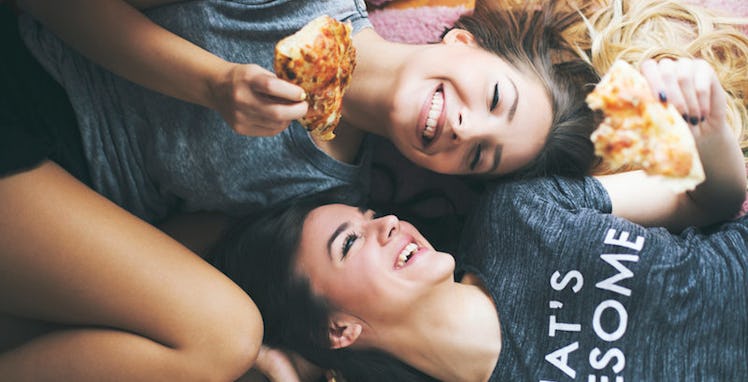
How This Generation's Obsession With Selfies Correlates With Mental Disorders
From young ages, our brains are trained to build confidence as we embrace the beauty in our flaws and our individuality. However, in recent years, Whitney Houston’s signature message seems to have gotten lost in translation.
Two ongoing media trends are getting linked together as contributors to one another’s affluent presence among this generation’s culture: selfies and mental disorders.
It may sound extreme, but expert psychologists are sharing their studies with the public and the results are concerning.
Narcissism, OCD, superficial obsessions, unrealistic expectations, entitlement, insecurity and other underlying traits can be magnified through selfies and can lead to destructive behaviors.
Clinical psychologist Bart Rossi said,
Today too many people are interested in making a statement about themselves on the internet and creating an influential existence. Selfies, when used to excess show a lack of depth and a shallow personality. If someone is obsessed with taking selfies it is most likely because the individual is self-absorbed and narcissistic.
As people share their photos on every social media platform at their own disposal, we assess more about them than they may realize they are disclosing.
When a female expresses herself in a half-naked selfie with an obscure musical lyric underneath, what is she saying about herself? It is a clear attempt and reach for reassurance of her appearance and attention and offers a complete lack of substance.
To some individuals, this is simply an obvious confirmation of deeper-rooted issues than she ever meant to expose.
Men pose in front of bathroom mirrors, claiming to show off their transformational fitness and health results, but in actuality, they aim to feed their own egos as they boast about personal accomplishments.
Individuals gratify this type of behavior and obtain happiness based on the number of “likes” they receive.
The evidence is clear, as our nation is self-obsessed in every essence of the word. The trend has become so prominent in our society that "selfie" was added to the dictionary and even led to a hit song, which parodied our own self-obsession. However, we did not let that stop us.
Our generation’s “selfie obsession” has turned into an entire industry.
From Ellen’s Oscar selfie to the highly-criticized selfie at Nelson Mandela’s memorial service from the US president, it is clear that selfies have become the biggest and longest-lasting trend of our generation.
Selfies are not just affecting our media sources, but they are also influencing seemingly average individuals to make extreme alterations for the sake of their selfie-images.
Selfies are accessible to us on every social media platform, as individuals flood the virtual world with their photos. The most credible way to promote your relevance rests in the number of “likes” on your selfie.
There are apps to enhance these images — to smooth out skin, erase dark eye circles, whiten teeth and even thin out facial structure and features — all on a quest for the perfect picture. However, as we know, these apps are not real, nor do they equal permanent changes.
The results do not reflect accurate images, which leads to severe dissatisfaction with how we actually look and who we actually are.
Dr. Philip Miller is widely acclaimed as one of New York City’s premier cosmetic, facial and specialty rhinoplasty surgeons, and has experienced a radical boom in business due to this intense distortion of one’s physical image and one’s self-esteem.
Dr. Miller has experienced a 10 percent increase in rhinoplasty surgery consultations based on a person's desire to achieve the ideal nose for a selfie. Although this seems drastic, the “selfie industry” is single-handedly boosting the plastic surgery industry.
Dr. Phillip Miller is at the forefront of this evolution and hopes to address and discuss the potential effects and future outcomes.
The physical ideals are only branding themselves in a stronger, more unrealistic capacity, as selfies are causing increasing cases of body dysmorphic disorder among young women and men.
Filters, lighting and angles provide the outcome of flawless features that simply cannot be recreated or accurate in real life.
Plastic surgery has skyrocketed in a quest for the "perfect pic," and individuals have learned all of the tricks, down to a scientific formula, to create the ultimate God-like image of themselves.
With all the negative feedback, Dr. Bart Rossi attempts to justify a different perspective of selfies. He says,
Selfies can be used to have some fun and actually show some good traits of individuals exploring life, happiness, and adventure.
Two things can happen here: a false sense of over-confidence and entitlement or a false sense of self-consciousness, accompanied by bigger issues that will affect multiple areas of a person's life.
Either way, selfies are being classified as doing more negative than positive, referencing back to sociology’s behavior context of “I vs. Me vs. Self,” and what is real.
So much information broadcasting the correlation between selfies and potential mental disorders has surfaced in recent months. However, people are unfazed and continue to post their indulgent selfies as often as the enablers, who fill the void and double tap the photos.
The addiction to selfies has been alarming to psychological healthcare professionals who fear we are raising a generation that relies on attention-seeking social dependence with no compassion, understanding or identity of any kind.